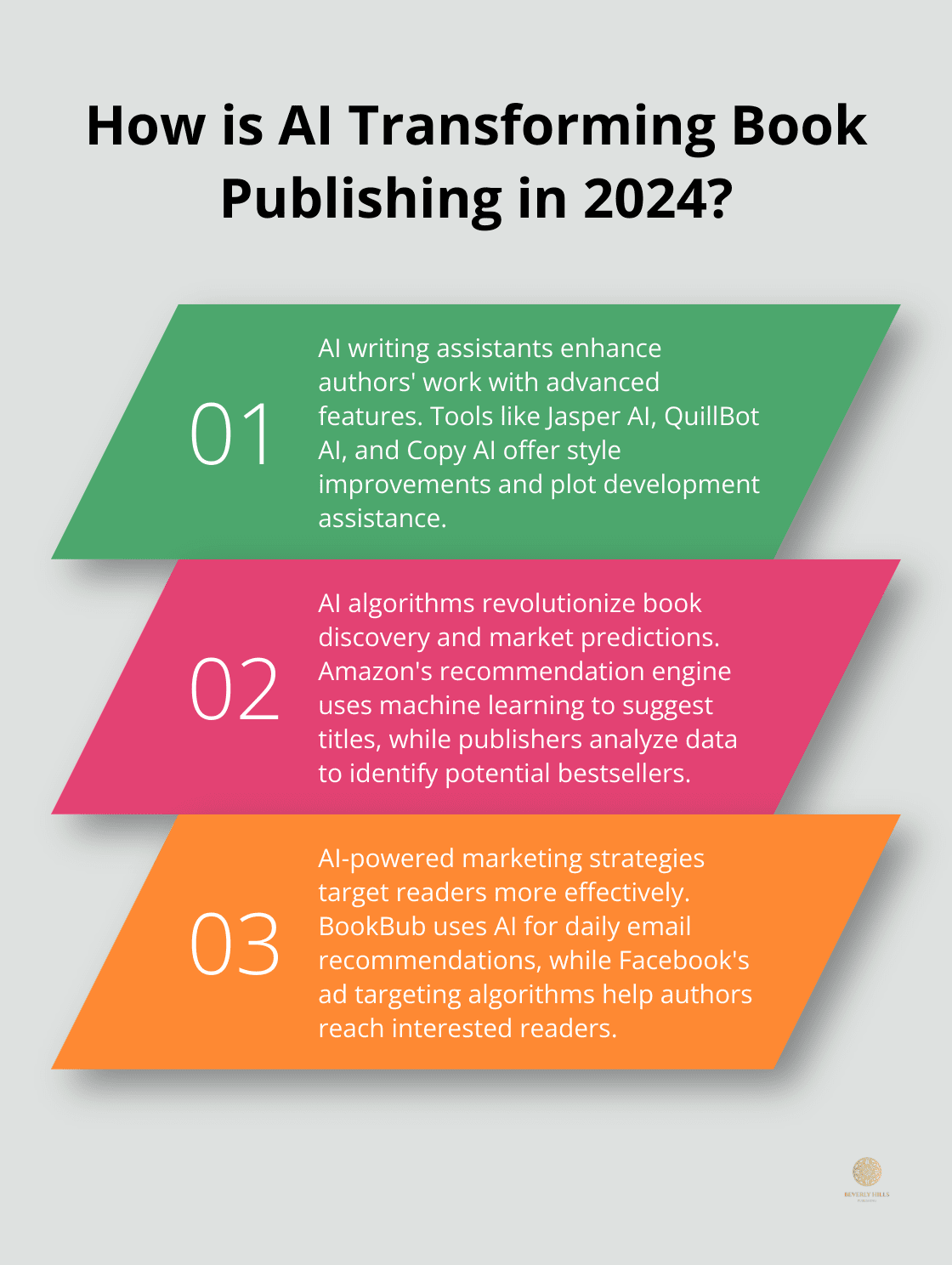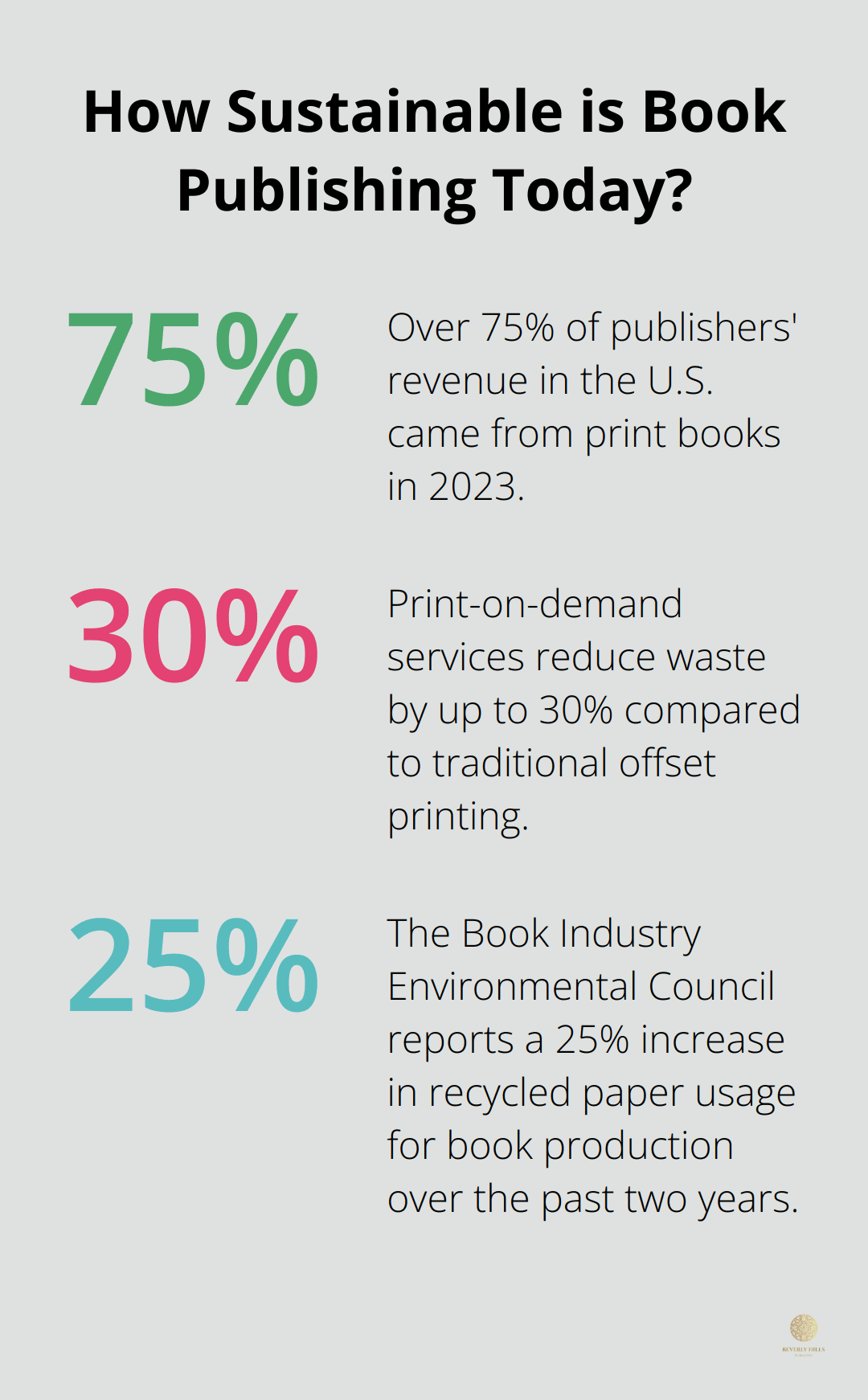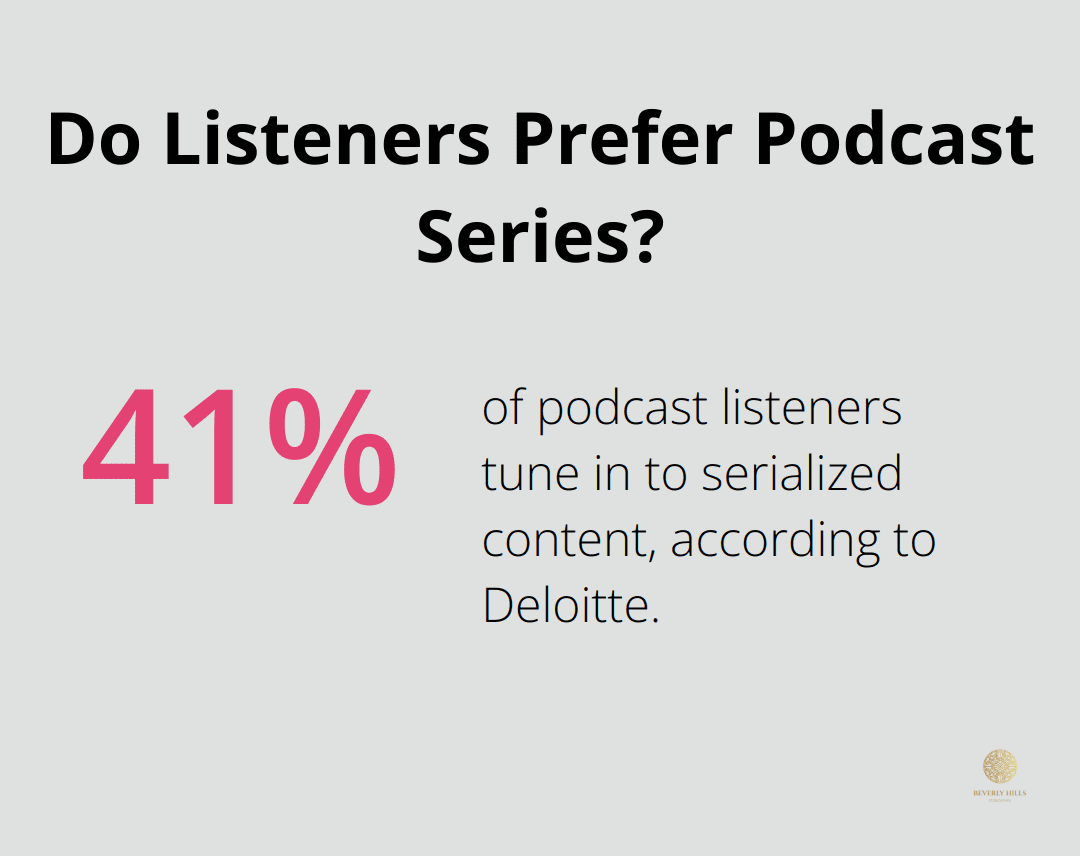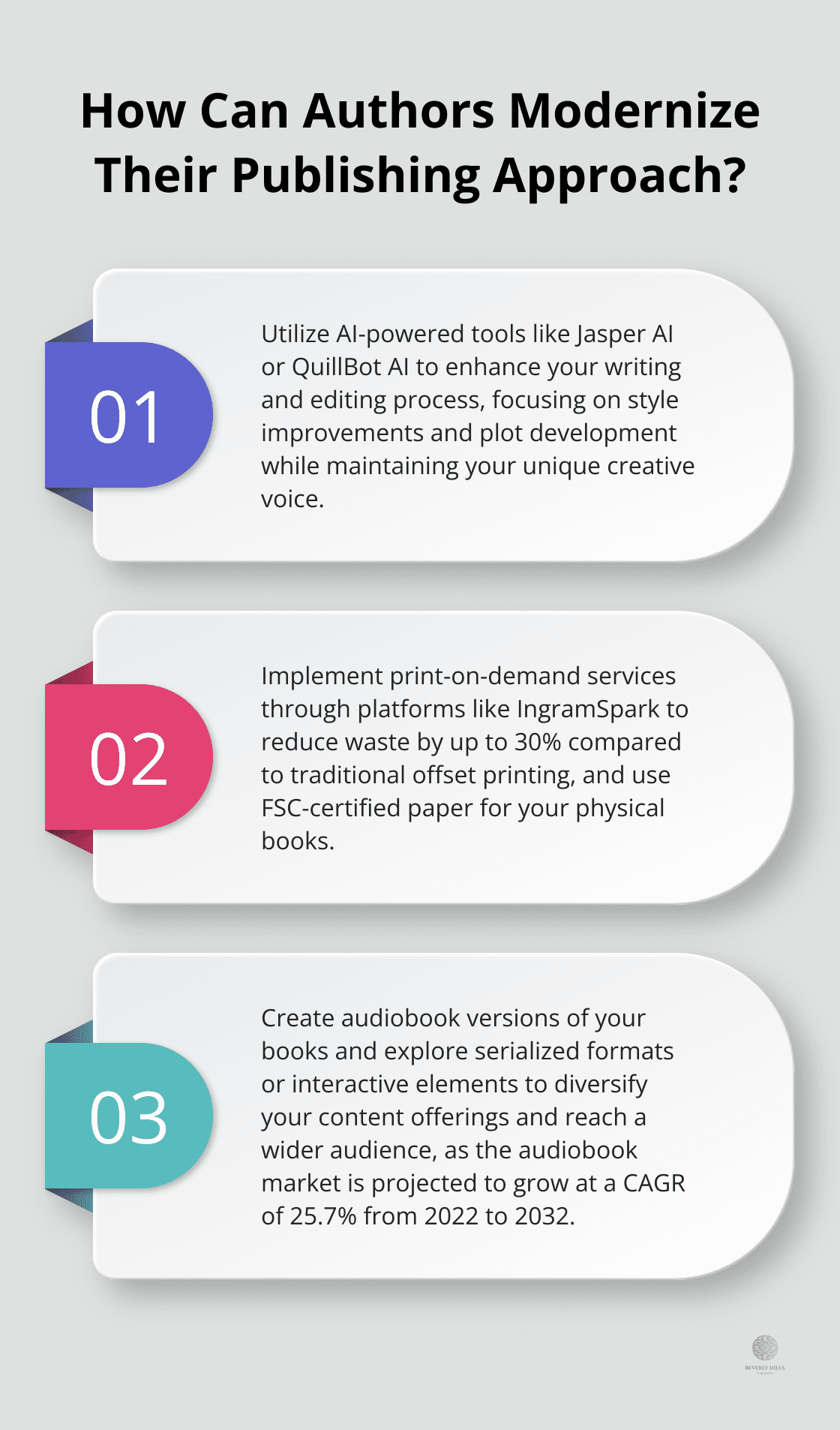At Beverly Hills Publishing, we’re excited to explore the book publishing trends shaping 2024.
The industry is evolving rapidly, with new technologies and consumer preferences driving significant changes.
From AI-powered tools to sustainable practices and innovative audio formats, these trends are reshaping how books are created, marketed, and consumed.
Let’s examine the key developments that authors and readers should watch in the coming year.
How AI Transforms Book Publishing in 2024
Artificial Intelligence (AI) revolutionizes the book publishing industry in 2024. This technology changes the game for authors and publishers alike, offering new tools and strategies across various aspects of the publishing process.
AI-Assisted Writing and Editing
AI writing assistants now offer advanced features that transcend simple grammar checks. Tools like Jasper AI, QuillBot AI, and Copy AI suggest style improvements, detect inconsistencies in tone, and even assist with plot development. These AI tools serve as powerful aids to authors, enhancing their work rather than replacing human creativity.
Personalized Book Recommendations
AI algorithms transform how readers discover new books. Amazon’s recommendation engine uses machine learning to analyze reading habits and suggest titles that align with individual preferences. This technology helps lesser-known authors find their audience and enables readers to discover hidden gems.

Publishers also use AI to predict market trends and identify potential bestsellers. By analyzing vast amounts of data on book sales, reader reviews, and social media buzz, AI helps publishers make more informed decisions about manuscript acquisition.
AI-Powered Marketing Strategies
AI makes a significant impact in marketing as well. AI tools analyze reader behavior and preferences to create targeted marketing campaigns. For instance, BookBub uses AI to determine which books to feature in its daily email recommendations, resulting in higher conversion rates for authors and publishers.
Social media advertising becomes more effective with AI. Facebook’s ad targeting algorithms help authors reach readers who are most likely to be interested in their books based on online behavior and interests.
Ethical Considerations and Human Touch
While AI offers numerous benefits, it’s important to approach these tools with a critical eye. They can’t replace the human touch in storytelling, editing, and marketing. The most successful authors and publishers in 2024 will find the right balance between leveraging AI capabilities and maintaining the unique human elements that make great books truly special.
As we move forward, the integration of AI in book publishing raises important questions about creativity, authenticity, and the role of human authors in an increasingly automated world. These considerations will shape the future of the industry as it adapts to technological advancements.
Green Publishing Revolution
The publishing industry embraces sustainability as a core principle, not just a trend. Environmental concerns drive publishers and authors to adopt eco-friendly practices that reduce their carbon footprint and appeal to environmentally conscious readers.
Digital-First Approach
A shift towards digital-first publishing models gains momentum. In 2023, eBooks accounted for 10.5% of publishers’ overall revenue in the U.S., while print books dominated the market, contributing over 75% of revenue. This trend reduces paper usage and minimizes transportation and storage costs associated with physical books.
Eco-Friendly Print Practices
Innovative printing technologies make a significant impact on physical book production. Print-on-demand services (like those offered by IngramSpark) reduce waste by up to 30% compared to traditional offset printing. These services print books as ordered, eliminating the need for large print runs and unsold inventory.

Vegetable-based inks replace petroleum-based alternatives, reducing harmful emissions during the printing process. Some publishers experiment with algae-based inks, which offer biodegradable and lower environmental impact alternatives.
Sustainable Materials
The choice of materials for physical books evolves. The Book Industry Environmental Council reports a 25% increase in recycled paper usage for book production over the past two years. Forest Stewardship Council (FSC) certified paper ensures that wood comes from responsibly managed forests.
Innovative publishers explore alternative materials. For instance, some companies produce notebooks using recycled stone waste and non-toxic resin, offering a water-resistant and tree-free alternative to traditional paper.
Publishers rethink book packaging as well. Biodegradable shrink wrap and compostable mailers become more common, reducing plastic waste in the distribution process.
Reader Demand Drives Change
Sustainability becomes a key factor in readers’ purchasing decisions. This shift in consumer behavior pushes the industry to adopt more environmentally friendly practices. Publishers who prioritize sustainability (such as Beverly Hills Publishing) position themselves favorably in the market.
As the industry continues to innovate in sustainable practices, the next frontier in publishing evolution emerges: the integration of audiobooks and podcasts. This trend represents a significant shift in how readers consume content and how authors reach their audiences.
Audio Revolution in Publishing
The fusion of audiobooks and podcasts with traditional publishing marks a significant shift in how readers consume content. This trend reflects the growing demand for flexible, on-the-go reading experiences that fit into busy lifestyles.
The Rise of Hybrid Formats
Audiobook sales have seen a steady increase, with the Audio Publishers Association reporting a 25% growth in 2022. This surge has led to the development of hybrid formats that combine text and audio. For example, Kindle’s Whispersync technology allows readers to switch seamlessly between reading and listening to a book, catering to diverse preferences and situations.
Serialized Content Takes Center Stage
Serialized audiobooks and podcast tie-ins gain traction. Platforms like Serial Box (now Realm) pioneer this approach, releasing episodic content in both audio and text formats. This model keeps readers engaged over time and allows for more frequent content updates. According to Deloitte, 41% of podcast listeners tune in to serialized content, indicating a strong market for this format in the book world.
Interactive Listening Experiences
Interactive audiobooks push the boundaries of traditional storytelling. The Global Audiobooks Market is expected to grow at a CAGR of 25.7% from 2022 to 2032, with revenue projected to reach $39.1 billion by 2032. Companies like Earplay and Choice of Games create choose-your-own-adventure style audiobooks where listeners make decisions that affect the story’s outcome. While still a niche market, this format shows promise, especially in children’s and young adult literature.
Diversifying Content Offerings
Authors and publishers who want to capitalize on these trends should consider diversifying their content offerings. Producing high-quality audio versions of books is no longer optional but essential for reaching a wider audience. Additionally, exploring serialized formats or interactive elements can help books stand out in a crowded market.
Balancing Innovation and Storytelling
The audio revolution requires a balance between innovation and the timeless art of crafting compelling narratives. Publishers (like Beverly Hills Publishing) who successfully navigate this balance will lead the industry forward. The most successful publishers will maintain the integrity of storytelling while embracing new technologies, creating engaging audio experiences that resonate with modern audiences.

Final Thoughts
Book publishing trends in 2024 will reshape the industry. AI will enhance writing, editing, and marketing processes, while sustainability initiatives will transform production methods. The audio revolution will blur lines between traditional books, audiobooks, and podcasts, opening new avenues for storytelling and audience engagement.

These changes present opportunities and challenges for authors and readers. Authors must adapt to new technologies and formats while maintaining their creative voice. Readers will benefit from diverse content options but may need to navigate a more complex literary landscape.
Companies like Beverly Hills Publishing lead this transformation, offering authors support to navigate these trends. They combine cutting-edge publishing techniques with strategic branding and marketing to help authors establish themselves as industry leaders. The successful integration of these trends will define the future of book publishing.















































































































































































































































